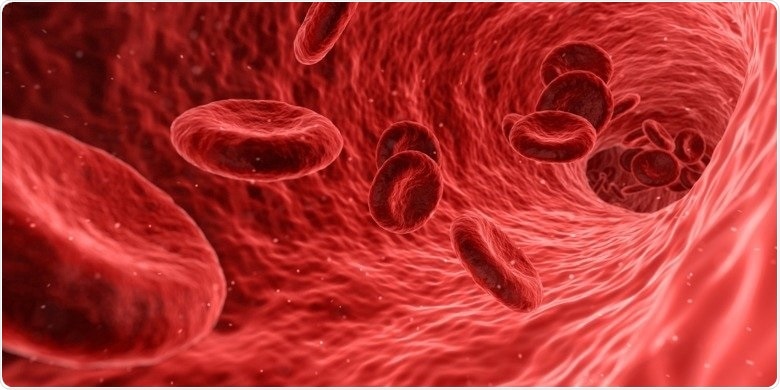In type 2 diabetes, the modified function of the red blood cells causes vascular damage. The findings of a new study on cells collected from patients with type 2 diabetes and mice reveal that this effect due to low levels of a vital molecule in the red blood cells.

Illustration of red blood cells. Image Credit: Pixabay.
The study by scientists from Karolinska Institutet in Sweden has been reported in the journal Diabetes.
It is familiar that type 2 diabetes patients are vulnerable to a higher risk of cardiovascular disease. As time passes, type 2 diabetes may cause damage to blood vessels, which could cause life-threatening complications like stroke and heart attack.
But the disease mechanisms behind cardiovascular injury in type 2 diabetes are mostly unknown, and at present, there is a lack of treatments to avoid such injuries.
Latest studies have demonstrated that the red blood cells, whose main job is to carry oxygen to bodily organs, turn dysfunctional in type 2 diabetes and can serve as mediators of vascular complications.
In this study, Karolinska researchers have analyzed cells collected from patients with type 2 diabetes and mice to identify which molecular changes in the red blood cells could lead to such harmful effects in type 2 diabetes.
Reduced levels of microRNA-210
The team identified that levels of the small molecule microRNA-210 were considerably reduced in red blood cells from 36 patients with type 2 diabetes than red blood cells of 32 healthy subjects.
Micro-RNAs are a class of molecules that act as regulators of vascular function in diabetes and other conditions. The decrease in microRNA-210 led to changes in certain vascular protein levels and thus impaired blood vessel endothelial cell function.
Lab experiments showed that restoration of microRNA-210 levels in red blood cells inhibited the development of vascular injury through particular molecular changes.
The findings demonstrate a previously unrecognized cause of vascular injury in type 2 diabetes. We hope that the results will pave the way for new therapies that increase red blood cell microRNA-210 levels and thereby prevent vascular injury in patients with type 2 diabetes.”
Zhichao Zhou, Researcher, Department of Medicine, Karolinska Institutet
Zhou performed the study together with, among others, Professor John Pernow from the same department.
Source:
Journal reference:
Zhou, Z., et al. (2021) Downregulation of Erythrocyte miR-210 Induces Endothelial Dysfunction in Type 2 Diabetes. Diabetes. doi.org/10.2337/db21-0093.